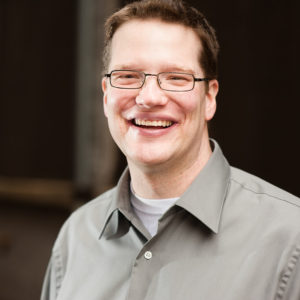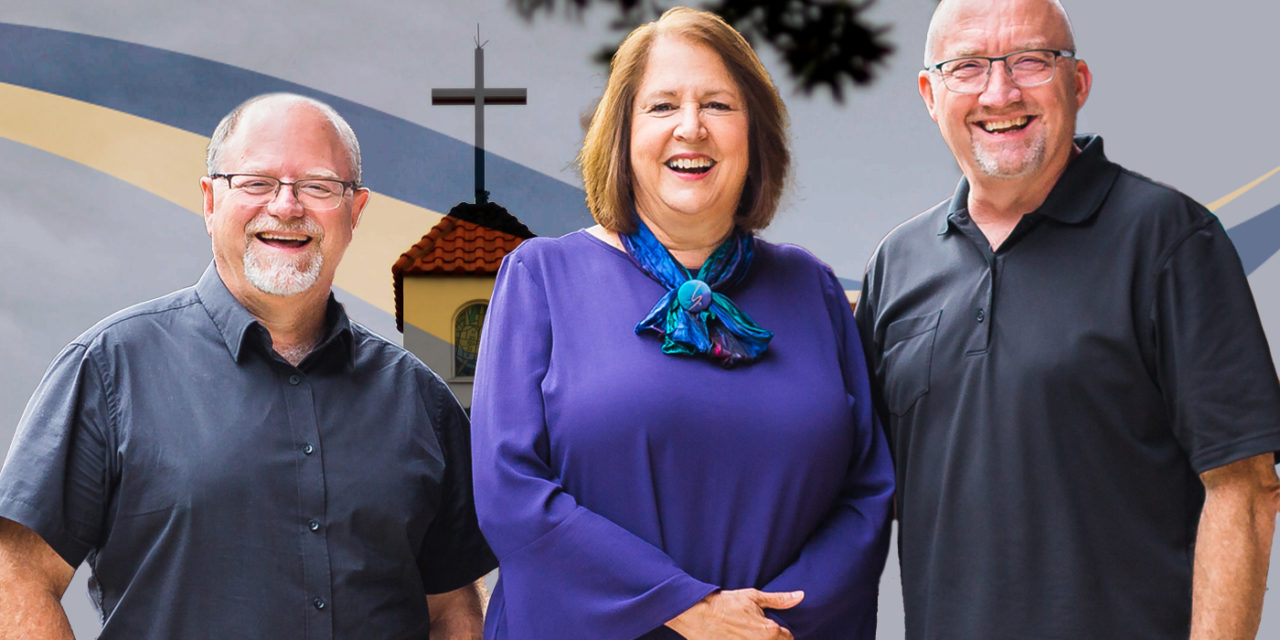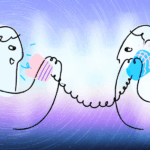A Light+Life Podcast
With guests Bishops Linda Adams, Keith Cowart and Matt Whitehead
Hosted by Brett Heintzman

Jeff Finley
Light + Life Executive Editor
Jeff Finley is this magazine’s executive editor. He joined the Light+Life team in 2011 after a dozen years of reporting and editing for Sun-Times Media. He is a member of John Wesley Free Methodist Church where his wife, Jen, serves as the lead pastor.
by Jeff Finley
A lot has happened in the two years since Linda Adams, Keith Cowart and Matt Whitehead were elected as the new bishops of the Free Methodist Church – USA. At the halfway point in their inaugural four-year term, the three leaders took time for a candid conversation with denominational Communications Director Brett Heintzman on The Light + Life Podcast.
“We really enjoy working together. We laugh a lot and occasionally we cry together too,” Whitehead said. “We feel the thumb of the Holy Spirit in our back to use this time strategically to make all of the impact that we can.”
His colleagues agreed.
“We all three just have an amazing, humbling sense that God has chosen us to lead the church for such a time as this. This has obviously been a challenging couple of years just because of the events that have gone on in our country and the world,” Adams said. “It’s been a time of spiritual growth and learning to lean on Jesus, learning to collaborate with one another in deep ways. I’ve pressed in a lot this year to Psalm 1 about being like a tree that’s planted by the rivers of water. That description is the person whose delight is in the law of the Lord, and, in His law, the person meditates day and night.”
The bishops found unexpected space in their schedules as the COVID-19 pandemic halted their travel. While U.S. travel eventually resumed, international travel remains difficult.
“It was definitely a whiplash effect. We were all three running 90 miles an hour in three different directions the first five months, and then, all of a sudden, everything stopped,” said Cowart, who added that the bishops have been able to spend more time with each other taking a close look at the FMCUSA. “We love the U.S. Free Methodist Church, and we’re grateful for this season that God has given us to really focus on the needs here at home.”
Whitehead said “this COVID grounding” has given the bishops a unique opportunity, “unlike anything experienced by previous boards of bishops, that allowed the three of us to really center in on looking at the big picture and ‘What does it mean to be a Free Methodist?’”
The bishops’ time for reflection and increased dialogue with superintendents and other leaders led to a statement of The Free Methodist Way that articulates core values such as life-giving holiness, love-driven justice, Christ-compelled multiplication, cross-cultural collaboration and God-given revelation.
“We’ve been doing a lot of good thinking, strategizing, planning and praying about how we go forward together and how does this movement that is over 160 years old maintain the vitality of our founders,” said Whitehead, who added that Free Methodists must simultaneously be “focused on the future and the expansion of God’s kingdom and this arena that God has given us to oversee.”
New challenges have emerged for the bishops along with leaders at the conference and local levels. In addition to the pandemic and the debate over restrictions, racial tensions and political divisions escalated last year. As the entire nation seemed to become increasingly polarized, some of the debate affected individual congregations.
“Without question, it was hugely challenging, and it just seemed that one thing piled on to the other,” Cowart said. “Our pastors and our superintendents faced challenges that were so difficult, and we were incredibly grateful for the leadership that emerged from our churches and our superintendents.”
Clarification of our longtime values has contributed to unity in the church during a time of division in our nation. This has led to “a gracious confidence that recognizes we are a kingdom people and we are part of God’s whole big family around the world, but there is something special about our faith tribe,” according to Adams.
“The reception of The Free Methodist Way has been just amazing. It has brought together people who consider themselves old-fashioned traditionalists and people who lean into more what they think are progressive issues and themes,” she said. “The truth is the Lord helped us to clarify a middle way or a higher path that doesn’t land on one side or other of all kinds of issues but really finds that place it seems Jesus has led the Free Methodist Church to embrace.”
The Free Methodist Way reflects where the denomination stands while also helping Free Methodists aspire to find new opportunities to live out values such as love-driven justice.
“As biblical Christians, justice is an issue that we can’t ignore. Scripture just continually speaks about justice over and over again,” Cowart said. “For some people, the word justice itself means something that’s social and devoid of Scripture, and we’re just not willing to give that up. We can’t give up the biblical idea of justice.”
Cowart said one of the places where consideration of justice has been “particularly painful is around the issue of race. … This past year really exposed that there’s some real pain in our movement around the issue of race, there’s some real controversy in our movement around that. We can stick our head in the sand, or we can wade into it and say, ‘OK, Lord, help us to understand more fully, more completely what it means to be one in Christ and yet different as well.’”
The bishops are working with consultant Tali Hairston, the former director of Seattle Pacific University’s John Perkins Center, to explore how the church can engage in racial reconciliation with congregations in different cultural contexts. Hairston “has talked about putting out an invitation to a journey rather than creating a one-size-fits-all program that we’re just going to assign to every church,” Cowart said. “It’s an invitation to an honest, authentic journey where we’re truly listening to one another, truly trying to understand one another and learning from one another in the process. ”
Adams said the bishops have begun “the process of thinking through some rebranding, both in terms of our verbal identity and then our visual identity.” She said the bishops are consulting with others as they seek new expressions in the 21st century while remaining true to Free Methodism’s roots. Visual changes possibly could include the denominational logo along with fonts and color schemes.
Shared Leadership
Leadership and implementation aren’t limited to the Board of Bishops’ office, and the bishops are seeking to identify key practitioners and bring them into leadership.
“Because we’ve had this opportunity to do a reset and spend significant time together thinking about our future, we’ve recognized that the three of us really need other key people to come alongside if the things we’ve been talking about will really be lived out in the future and who we will be by God’s grace,” Whitehead said. “One of the things that the three of us are very excited about is really a new understanding of what we’re calling an Executive Leadership Team. Over the course of these months as we’ve thought about our future, we believe God has called on us to make some really specific hires.”
Cowart said the bishops “are trying to identify individuals who have demonstrated proven excellence in these particular areas and ask them to help us influence across the whole Free Methodist family by bringing their skill set, their expertise, to the table.”
As the church pursues Christ-compelled multiplication, Whitehead said the bishops “felt like we have to have somebody who has expertise and a proven track record in multiplication, and so we’ve just announced in the last few weeks that Drs. Larry and Deb Walkemeyer out of the Long Beach church in the Reach Conference are joining this XLT with us.”
The bishops have finalized a job description for a team member who would concentrate on love-driven justice. Whitehead said justice includes areas of race, ethnicity and gender including “the role of women in our ministry family. From the very beginning, we have been a group that says we believe in the full empowerment and ordination of women.”
Other key leadership team members include Heintzman, Director of Global Church Advocacy Gerald Coates, Chief Operating Officer Mark Dowley and Director of Pastoral Formation Steve Tungate.
Adams said the team members are being called “strategic catalysts” because instead of being super heroes doing the work alone, they are “going to be working with people in all of our networks that are already — from the grassroots level — caring about these various things.”
The bishops hope groups emerge at the conference level to advocate for The Free Methodist Way values, and they believe superintendents are essential to successful implementation of these values.
“One of the things we’ve realized is the incredible power and gifting of our superintendents. These catalytic strategists with justice, multiplication and global ministries are an opportunity to come alongside each of our conferences and each of our superintendents to live out this commitment to The Free Methodist Way,” Whitehead said. “The three of us are really encouraged to have other people at the leadership table with us as we think about what does it mean to live out not only the vision God’s given us but the day-to-day, month-to-month implementation of the vision.”
Global Connections
The majority of Free Methodists (approximately 94 percent) live outside the United States, and their experiences have given them valuable perspectives.
“The church is strong around the globe. The Free Methodist Church has been growing substantially. There’s much we can learn,” Cowart said. “One of the places where our global church is especially strong is responding to suffering and difficulties — responding to difficult environments to live out the gospel. So many of our world Free Methodists are living in places where to be a Christian means you’re going to come under persecution. Suffering is normal. It’s just a part of their everyday life. … They’re not dealing with the pandemic by talking about masks and restrictions. They’re doing whatever it takes to be healthy and continue to be reaching their world with the gospel of Jesus Christ.”
One way to support global Free Methodists is through the Bishops’ Crisis Response Fund. Whitehead said Free Methodists have given $1 million through the fund and ICCM in the past year for food, medical care and other support for the church around the world as needs have increased during the COVID-19 pandemic.
“While we celebrate that $1 million, we would also have to be honest and say that the Bishops’ Crisis Response Fund is at the lowest point that it’s been at for a long time.” Whitehead said. “We are calling on Free Methodists in the spirit of generosity to please contribute; 100 percent of every dollar that you give to the BCRF goes directly to needs.”
Prayer Support
The bishops expressed appreciation for the prayers of Free Methodists.
“In every annual conference where I have been, people have come up and said, ‘We are praying for you. We pray for you every day,’” Whitehead said. “I just want to say to the church: Thank you so much for your prayers and your support and your encouragement. We feel that. … We’re so grateful for the ways the Lord is at work in this church that we love, and, by God’s grace, we’re leading into a future of kingdom expansion.”
+

Jeff Finley
Light + Life Executive Editor
Jeff Finley is this magazine’s executive editor. He joined the Light+Life team in 2011 after a dozen years of reporting and editing for Sun-Times Media. He is a member of John Wesley Free Methodist Church where his wife, Jen, serves as the lead pastor.









